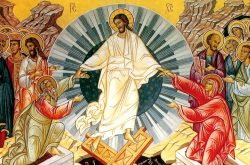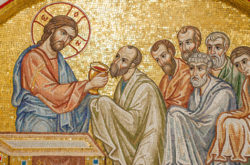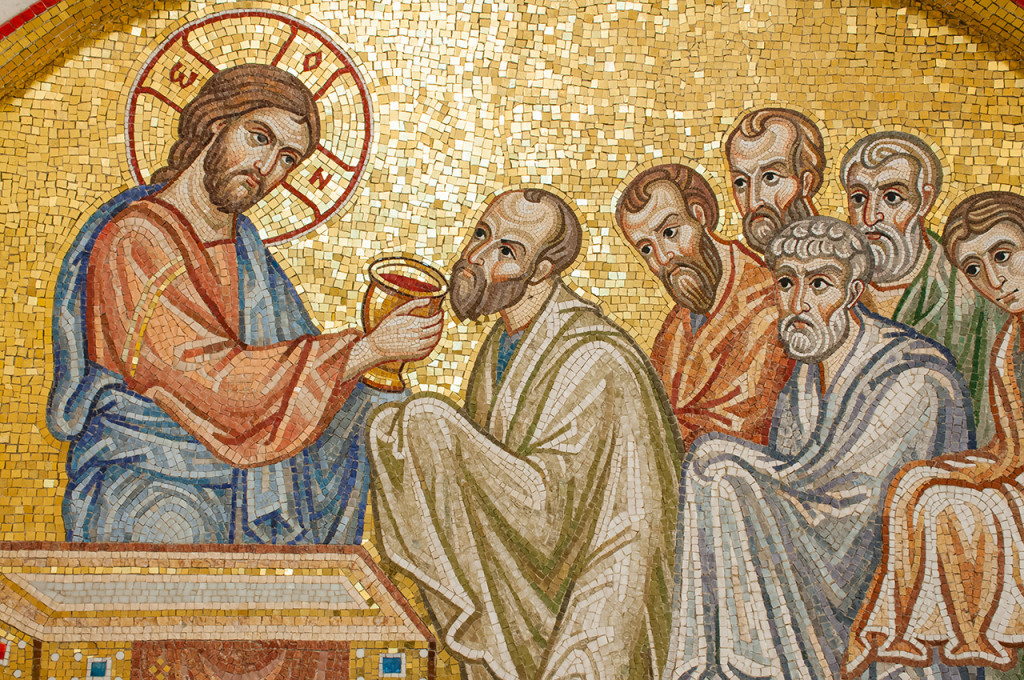無論何時來教會,總會有些小神蹟發生在你我身上;
因為我們親身參與了最大的神蹟:聖餐禮。
2014.12.07 路加福音第十主日 –
以弗所書5:8-19「從前你們是暗昧的,但如今在主裡面是光明的,行事為人就當像光明的子女。光明所結的果子就是一切良善、公義、誠實。總要察驗何為主所喜悅的事。那暗昧無益的事,不要與人同行,倒要責備行這事的人;因為他們暗中所行的,就是提起來也是可恥的。凡事受了責備,就被光顯明出來,因為一切能顯明的就是光。所以主說:你這睡著的人當醒過來,從死裡復活!基督就要光照你了。你們要謹慎行事,不要像愚昧人,當像智慧人。要愛惜光陰,因為現今的世代邪惡。不要作糊塗人,要明白主的旨意如何。不要醉酒,酒能使人放蕩;乃要被聖靈充滿。當用詩章、頌詞、靈歌、彼此對說,口唱心和的讚美主。」
路加福音13:10-17 「安息日,耶穌在會堂裡教訓人。有一個女人被鬼附著,病了十八年,腰彎得一點直不起來。耶穌看見,便叫過他來,對他說:女人,你脫離這病了!於是用兩隻手按著他;他立刻直起腰來,就歸榮耀與神。管會堂的因為耶穌在安息日治病,就氣忿忿的對眾人說:有六日應當做工;那六日之內可以來求醫,在安息日卻不可。主說:假冒為善的人哪,難道你們各人在安息日不解開槽上的牛、驢,牽去飲嗎?況且這女人本是亞伯拉罕的後裔,被撒但捆綁了這十八年,不當在安息日解開他的綁嗎?耶穌說這話,他的敵人都慚愧了;眾人因他所行一切榮耀的事,就都歡喜了。」
李亮神父講道:
今日福音書內容是說到來教會是多麼有福的一件事。這段經文是耶穌在安息日去到會堂,在會堂中有個婦人病了十八年,脊椎的問題,使她的腰彎得一點直不起來。試著想像一下,一個人十八年來一直要駝著背、彎著腰,拄著拐杖行走。這是非常痛苦的,對吧?即便如此,她並無咒詛神,沒有因此就說:「我十八年一直都這樣上教會,但我看不到我生命中任何善報!」反而那天,耶穌來到那個會堂,那就是屬於她的日子。實際上,也不能說只有這天是她的日子,十八年的受苦中,神的恩典一直與她同在。她沒有詰問甚麼,也沒有向耶穌要求什麼好處。但當耶穌看到她,祂說:「女人,你脫離這病了!」祂將手放在她的身上,她已經病了十八年,這是她生命中最美好的一年,她痊癒了,能立起了身、直起了腰。
我要告訴你的是,無論何時我們來到教會,總是會有些小神蹟發生在你我身上。我說小神蹟,其實是錯誤的措辭。因為在天上、在地上,這是最大、最至高的神蹟。因為神降世為人,成為肉身,我們領受祂的聖體聖血;無論天上、地上,並無另外的神蹟可與之比擬。
但是如我說的,總是會有些事情發生。有時候我們能了解,但有時我們卻不明白。我稍後再解釋這件事。但首先我要說的是在福音書中,眾人的反應。這段經文中有個管理會堂的人,這個人實際上並不是在會堂中進行教導。他只是持有會堂的鑰匙、負責打掃、簿記和管理秩序等工作。但他對神蹟的反應非常可怕。這個婦人是他的姐妹,是神的創造,對於婦人可免於受苦這件事,管會堂的這人沒有為她開心。他也沒有為此而榮耀神,感謝神說:「我的姐妹,也是我們的朋友,她已經在此聚會十八年了,如今得了醫治。」沒有,他不是這麼說的。我稍後會再說明他的感受,那是一種結合妒嫉和憤怒的複雜情緒。
因為耶穌行了神蹟,管會堂的人不敢對耶穌基督說什麼,沒有人敢質問祂。他也沒有對婦人說什麼,因為想像一下,那個婦人正在開心地榮耀神,周圍的群眾也向她祝賀、歡欣。因此這個管會堂的人轉而向眾人說話,訓斥他們。
首先,他的工作不在於教導眾人。我們在傳統的東正教會也多次看見類似的事,總是有人覺得自己就是教會的神。這樣的人會對你說你穿著不妥,你的頭巾不合禮儀,又會對十字聖架、點蠟燭、坐這坐那等等,什麼都有高見,宛如他自己就是神一般。
我記得一次我在雅典時,我因為喜歡每天去教會,去到某一間教會,這個教會的人不認識我,而那是個大日子,詳細是什麼日子我記不得了。我那時留著長髮,我才從St. Porphyrios (那時他是神父,尚未封聖)所在的一個老舊小鎮回來,所以我的鞋子、雙手都很髒。我記得有個姐妹到我面前質問我:「你是誰?你懺悔了嗎?」她其實無權這樣問我,因為她並不是神父,她只是一個每日去教會的一般信徒,但她卻把教會當成她的房子。她看到我很髒又留著長髮,因此看不順眼。我說:「是的。我懺悔了。」她又接著質問:「是誰為你行懺悔聖事?」我回答:「Porphyrios神父」她一臉驚訝地說:「哇!那…好吧」。她是否有資格告訴我是否能領受聖餐呢?這並不是她的職責。
從福音書中的故事來看,這管會堂的人其實是一個無神論者。他告訴群眾:「有六日應當做工;那六日之內可以來求醫,在安息日卻不可。」這是為什麼耶穌對他說話非常嚴厲的原因,耶穌稱他為「假冒為善的人」,甚至對他說:「難道你們各人在安息日不解開槽上的牛、驢,牽去飲嗎?況且這女人本是亞伯拉罕的後裔。」她已被撒但綑綁了十八年,這樣荒費了她的光陰;想像一下,撒但是這樣摧毀她的生命。我說「想像一下」,是因為人很容易看見她外在的難處,但只要想像一下,你就能明白誰會願意娶這個女人,誰又願意和她住在一起?這不只是身體上的難處,也是社交互動上的困難-她的怒氣、結婚的問題、找到愛與被愛的人總總的困難:這是個被浪費與摧毀的生命。
我們可以看到這個管理會堂的人如何讓會眾不要說話。他甚至不求耶穌的原諒,耶穌在那時至少被視為一個老師、拉比。他其實只是個管理會堂鑰匙和維持秩序的人。但他沒有說:「原諒我,我不該這麼愚蠢,謝謝你的教導。」(我會在用餐之後再討論這個話題,我們備有茶點,一起談話,我們討論今天的福音書和講道內容,透過錄影也可讓更多人明白教會生活化的一面。)這個人的反應,就像是使徒說的,因為掩藏的事沒有不顯出來的,隱瞞的事沒有不露出來被人知道的。這個人顯露出他自己其實是個無神論者。
但管理會堂的人,怎麼可能是個無神論者呢?我記得St. Porphyrios差我前往阿陀斯聖山(Mt. Athos)之前,我向他請求他的毛帽,現在那頂毛帽雖然很髒、很破舊,但我仍將它放在我的房中。離行前他最後對我說的話是:「我差你前往我在阿陀斯聖山的小屋,但在那裡你可別成了一個無神論者。」我很訝異地說:「無神論者?我去那裡,將要成為一位修士,怎麼可能變成無神論者?」他告訴我:「你難道不知道,身為一名修士,同時又是個無神論者,是多麼容易的事嗎?」我又問:「怎麼可能呢?」他告訴我:「可能的,只要你將每件事都變成規矩。你可以禱告,但是你只是在張口讀禱文,只是在完成你的職責。認為職責就是要唸一百次禱詞,要俯伏跪拜三百次等。」你將這些事視為你的職責,但卻不是真的在乎,只是行禮如儀。
這就像夫妻或情侶之間的愛,相愛的二人在多年的婚姻之後,愛卻消逝、死亡。那是因為他們沒有好好照顧愛,他們沒有將根基建於神身上,也不互相尊敬。妻子會想:「那又怎樣,我只是必須要和這個男人住在一起而已」;先生則想:「我必須和這個女人住在一起,她會幫我煮飯,我支付家庭開銷就可以了。」他們的心裡認為和誰住在一起其實並不重要,重要的是有個人可以住在一起。同樣,如果信仰成為一種習慣,就是成為無神論基督徒(religious atheism)的肇始。你可以看到法利賽人,他們的內在有許多的戲碼。他們的戲碼,就是把神的愛變成許多的規則和規矩,然後一點也不在乎神。他們只說:「安息日你不必工作,只要來會堂奉獻一些錢。」他們不是真的向神禱告,只圖外顯的行為,他們藉此衡量自己或別人是否是一個好基督徒。但我知不知道我是個好基督徒呢?我不知道。
我這週去了一間神學院,演說有關心禱的內容。有個人問我:「為什麼我們要說:『主耶穌基督憐憫我』;為什麼要求神『憐憫』我們呢?」他不明白。他認為他不需要神的憐憫,所以他認為在禱告中說些「神啊!你好嗎?」這類的句子是沒問題的。
我的意思是建立各式各樣的規矩是很容易的,像是規定要在身上畫幾次十字聖號,規定頭髮是否需要用頭巾遮蓋,或是規定穿著……等並不難。也有人會質問你有沒有禁食三天諸如此類的問題。首先教會法典(Canon)對於禁食並沒有上述那種規則,所以要求這樣的行為是異端。而要求這些繁瑣細節的人事實上沒有任何權柄或權力把其他人趕出教會。我可以舉出許多例子,很多人不來教會是因為教會中某些人,為了這些外在的事物而惡待別人,像是對別人的頭髮、穿著、坐姿……等等有諸多意見。這些因此惡待他人的人,犯的是非常大的罪。
你應該知道的事情,是你為何要來教會。如同我多次告訴你們,你不是來教會「觀賞」聖禮儀,好像去戲院看場電影或是聽場演講一樣。信徒是被膏抹(chrismated)的基督徒,你們來到教會是為了「參與」聖禮儀,即使沒有領受聖餐。誰能完成司祭的禱告?就是藉著信徒回應的「阿們」,完成我的禱告。只要司祭被任命為司祭,他就可在聖禮儀中念誦任何禱詞;但「阿們」一詞,是屬於信徒的。即使在最神聖的時刻,當司祭說:「我們懇切禱告求祢,派祢的聖靈臨到我們身上和呈現在此的祭品上。使這餅成為祢的基督珍貴的聖體。」信徒和執事也應立即同聲回應:「阿們」。特別是在聖巴西略聖禮儀祈禱文(Liturgy of St. Basil)中,就有寫明:「會眾說『阿們』」。現在聖禮儀中有時候會由我來說,那是因為信徒們沒有開口回應:「阿們」,而我不想因此中斷禮儀和影響專注。
所以你必須明白,你來到教會,是一件非常、非常嚴肅而重要的任務。因為沒有信徒,司祭無法單獨舉行聖禮儀。不管你有沒有開口唱詩,來教會不是為了表演,唱不唱詩不是重點。對一個東正教司祭來說,「罷工」不舉行聖禮儀是難以想像的。
但如果「罷工」的是信徒呢?如果信徒不來教會呢?如果你們不想參加聖禮儀呢?你們可能不在乎,覺得來不來沒有關係,心想反正有別人會來。當然我明白,你可能很忙、生病,或是週日需要上班等原因,讓你不能來教會。我的意思並非你們每週日都必須來教會,絕不可缺席。但你們要知道,教會在許多其他日子也舉行聖禮儀,像是週二、週三、週五、週六都有聖禮儀,除了一週中只有幾天我需要去大學上課。有時舉行聖禮儀,是出於特別的需要,像是上週有人需要動大手術,我們為此舉行聖禮儀。我在教會和另一位信徒一起舉行聖禮儀,神幫助那位病人順利通過一場重大而困難的手術。我身為司祭,舉行聖禮儀是最重要的,上課或演講其他事情都是其次的。
一定要了解的是,信徒來到教會,和司祭來到教會,兩者是以同樣的方式來到教會。信徒不來教會,就好像司祭說:「我累了,我不想舉行聖禮儀。」那該怎麼辦?教會就無法舉行聖禮儀了。有時候真的十分困難,就像昨天有個嬰兒接受洗禮,而我那時的血壓卻突然降到90/48 mmHg。但你們身體健康,卻不來教會?你來教會不是為了「觀賞」聖禮儀,而是因為要「參與」聖禮儀,要來回應:「阿們」,要來祈求:「主憐憫我」。即使唱詩班只有一個人唱頌:「主憐憫我」,你也必須在你的心中跟著唱頌。要記得我對你說的,這些對你而言也許陌生,但你要記得,我們每一個人在受洗、膏抹(堅振禮)之後都有司祭職分。雖然你們與我的司祭職分有所不同,但你們同樣都有司祭身分。不要忘了你們自己是司祭。
今日多數的東正教信徒(雖然羅馬天主教在過去將人們區分為一般信徒與祭司;他們在梵蒂岡第二次大公會議(the Second Vatican Council)後停止這樣的區分。)可能都認為「神父」才是司祭,自己不是司祭。但這大錯特錯。要記住你就是司祭,因為在這祭壇後面,我們還有另一個祭壇-我們的心。St. Maximus the Confessor,最偉大的神學家,他認為神聖的司祭職分是由每一個向「道」獻祭的人所組成,而心就是每個人的祭壇,如同在教會中你我所行的聖餐獻祭。要牢記你就是君尊的司祭,不要讓你的司祭職分死去。
是否有其他的問題要問,或者我們可以邊吃邊談,好嗎?
提問:為什麼要把手放在婦人身上醫病?
回答:我們午餐後會一起討論這個問題。
願 聖三一的神保守我們眾人。
*****************************
東正教會簡介:https://theological.asia/taiwan-orthodox
影片:午餐後的對話 (關於今日講道) http://goo.gl/sjfxu4
紀錄: Baker教授
翻譯: 張奉書
Photo http://goo.gl/FFYDpv
2014.12.07 Luke 10 – Coming to the Church as Priests
St. Paul’s Letter to the Ephesians 5:8-19 Walk as children of light (for the fruit of light is found in all that is good and right and true), and try to learn what is pleasing to the Lord. Take no part in the unfruitful works of darkness, but instead expose them. For it is a shame even to speak of the things that they do in secret; but when anything is exposed by the light it becomes visible, for anything that becomes visible is light. Therefore it is said, “Awake, O sleeper, and arise from the dead, and Christ shall give you light.” Look carefully then how you walk, not as unwise men but as wise, making the most of the time, because the days are evil. Therefore do not be foolish, but understand what the will of the Lord is. And do not get drunk with wine, for that is debauchery; but be filled with the Spirit, addressing one another in psalms and hymns and spiritual songs, singing and making melody to the Lord with all your heart.
The Gospel of Luke 13:10-17 At that time, Jesus was teaching in one of the synagogues on the sabbath. And there was a woman who had a spirit of infirmity for eighteen years; she was bent over and could not fully straighten herself. And when Jesus saw her, he called her and said to her, “Woman, you are freed from your infirmity.” And he laid his hands upon her, and immediately she was made straight, and she praised God. But the ruler of the synagogue, indignant because Jesus had healed on the sabbath, said to the people, “There are six days on which work ought to be done; come on those days and be healed, and not on the sabbath day.” Then the Lord answered him, “You hypocrites! Does not each of you on the sabbath untie his ox or his donkey from the manger, and lead it away to water it? And ought not this woman, a daughter of Abraham whom Satan bound for eighteen years, be loosed from this bond on the sabbath day?” As he said this, all his adversaries were put to shame; and all the people rejoiced at all the glorious things that were done by him.
Fr. Jonah’s Sermon:
The Gospel today is talking about how blessed it is to come to the church and here Jesus went to a synagogue. Of course it was Saturday, and in this synagogue there was a woman who was sick and could not stand up because she had a problem with her spine, she had been like this for eighteen years. Imagine that this had been going on and she had been walking like this with a stick for eighteen years. It is very painful, right? And she did not curse God, saying, “Eighteen years I am coming like this to the church and I don’t see any good thing in my life!” But on that day, Jesus came there. It was her day, the day for her. Actually, it was not exactly her day since all these eighteen years of suffering, excepting the Grace of God was always with her. So without asking anything; she did not ask anything of Jesus Christ, but when Jesus saw her, He said, “Daughter, you are free now.” He put His hands on her as she had been for eighteen years, the best years of her life, and she became well and she stood up.
I want to say to you that whenever we come to the church, always a small miracle is happening to us. I say a small miracle, but that is a mistake since it is the biggest and the highest miracle in the heavens and the earth. Because God becomes human, becomes flesh, and we receive him; there is no miracle higher than this on earth or in heaven.
But, as I say, something else always happens. Sometimes we understand, sometimes we don’t understand, and I want to say more about this later, but first I want to say something about the reaction of the people in the Gospel. You see, the head of the synagogue, the master, was there. Actually, this person was not teaching. He held the keys and had the responsibility of cleaning and bookkeeping, and to keep some order. His reaction to the miracle was terrible. He was not happy to see his sister, a creature of God, to be relieved of her suffering. He did not glorify God and say, “Thank you God! My sister, one of our friends, a person who has been coming to the church for eighteen years is healed. No!” He felt something that I will explain later, a mixture of jealousy and anger.
He did not dare to speak to Jesus Christ because He had just worked a miracle; who would dare to question Him? He did not say anything; he did not speak to the woman because, imagine, she would be very happy and glorify God. The people would say, “Aaah, so beautiful!” Right? Of course. And so he spoke to the people, accusing them.
First, his job was not to teach, and how many times have we seen this in the typical classical Orthodox churches in Orthodox churches, that there is always somebody there who pretends that he is the God of the church. He will say to you, “You are not dressed well,” or “You did not put on your hair-covering in the proper way;” “You did not cross yourself or light a candle;” “Sit here or sit there;” like he is God Himself.
I remember once when I was going to different churches in Athens because I liked to go to churches every day (anyhow that was a miracle), and one day in this church where they did not know me, and it was a big day, I don’t remember what. I had long hair then and I had just come from Father Porphyrios in the old part of town, so my shoes were very dirty, as were my hands. I remember a woman came to me and said, “Who are you? Did you confess?” She had no right to ask this because she was not a priest; she was just there in the church like someone who went every day and thought it was her house, but she saw me, very dirty, with long hair and so on. I said, “Yes,” and she said, “To whom!?” I said, “To Father Porphyrios,” and she said, “Ooooh! OK” What was this? Could she tell me whether or not I could receive the Holy Communion? That was not her job.
In this story from the Gospel, the master of the synagogue was an atheist. He said to the people, “There are six days of the week when you can come and cure yourselves, and Saturday is just to do nothing.” This is why Jesus Christ speaks to him so harshly, and He calls him, “Hypocrite!” And he says to him, “Even your donkey or your dog you will feed on Saturday, and this, the daughter of Abraham?” Satan had for eighteen years to be like this , to waste her time, imagine, to destroy a life. And I say, “Imagine,” because it is easy to see her outward problem, but just imagine, who would marry this woman? Who would live this woman? It was not only the physical problem, but it was the social problem, her anger, the problem of getting married, to find someone to love and to be loved by: this was a wasted and destroyed life.
And we see how this master of the synagogue had set up people not to speak. And he did not even ask forgiveness, as he should have because Jesus was recognized at least as a teacher, a rabbi, by the people. The other person was nothing, just someone who kept the keys to the synagogue and maintained order. But instead of saying, “Forgive me. I should not be so stupid. Thank you for your lesson.” (And I want to talk to you more about this later after the food – you know, we have food, coffee, and we talk a little bit and we have the camera so many people can see the how the church is a living thing, We speak about the Gospel; we talk.) Because with this person, as the Apostle says, there is no hidden thing that will not come out, as we read today. And what came out from this person? That he was an atheist.
But how is this possible that he was an atheist and he was responsible for the church? I remember that before St. Porphyrios sent me to the desert in Mount Athos, I asked him for his hat, this , and I still have it in my room, dirty of course and destroyed, His last words of advice before I left were, “I send you to my house in Mount Athos. Don’t be an atheist there.” I was so surprised; I said, “An atheist? I am going to become a monk; how could I become an atheist?” He told me, “You don’t know? It is so easy to become an atheist and still to be a monk.” I asked, “How?” And he said, “You will make everything a regulation. You may be praying, but you are just reading, ”Blah, blah, blah. OK I did my duty. My duty is to say one hundred prayers and prostrate three hundred times.’” You see this as your duty and you don’t really care but you just do it.
It is like the love between a husband and a wife, or between lovers. They loved each other, but after years of marriage the love is dead because they did not take care, because they did not base this on God and on respect for each other. So the wife thinks, “So what, I must live with this man.” The husband says, “I must live with this woman; she cooks for me; I bring some money to the house. If it is this person or somebody else is actually not important. The important thing is just that I have somebody to live with.” When religion becomes a habit, this is the beginning of religious atheism. You see the Pharisees; they were people with a lot of drama in them. What was their drama? They made the love of God into a set of regulations and rules and then they did not care for God. They just said, “Saturday you don’t work. You go to the temple and offer some money.” They don’t really pray to God; they just do outward acts. So they can measure, e.g. do I know I am a good Christian? I don’t.
This week I went to a theological institution to speak about the Prayer of the Heart, and somebody asked me, “Why should we say, ‘Lord Jesus Christ, have mercy on me?’ Why should we ask for mercy on us?” This person did not understand. He thought that he did not need the mercy of God. So he was thinking in prayer it was OK to say something like, “Hello God How are you doing?”
So my meaning is that it is easy to make the Church into a set of regulations, like how many big crosses should we make, should we come to the church with our hair covered or uncovered, what clothes we should wear. Other people will ask, “Did you fast three days, and so on and so on.” First of all, there is no canon about fasting in the Church, so people who ask this question are also heretics. And they don’t have any authority or right to throw people out of the church. I can give a lot of examples and we can talk later about how many people don’t come to the church because somebody in the church behaved so badly to them for external things, like if they have long hair or are not dressed properly or are not sitting properly. These people who say something like this have a very big sin.
Another thing is to know how and why do you come to the church. As I have told you so many times, you don’t come to the church to watch the Liturgy in the same way that you go to the theater or to a movie or some lecture. For those who are Orthodox because they are chrismated, you come here to participate in the Liturgy, even if you don’t receive the Holy Communion. Because who finishes the prayers of the priest? You finish my prayers, right? You know, the priest – as long as he has been ordained a priest – can say everything in the Liturgy – except the word “Amen.”When the priest says, “Send down Your Holy Spirit upon us and upon these gifts here presented. And make this bread the precious Body of Your Christ.” the people and the deacon say, “Amen.” Even at the most holy time, especially in the Liturgy of St. Basil it is written, “The people say Amen.” But sometimes I say it because the people don’t say it and I don’t want to create a problem and break the concentration.
So you must understand that you come here for a very, very serious job. Although you may not sing, although you do sing together, but the church is not a performance, is not singing. You must understand that singing or not singing is not the point. Imagine that if you came here and the priest was on strike. For an Orthodox priest this is unimaginable.
But the same thing happens if you don’t come. It’s as if you are going on strike and saying, “I don’t want to do the Liturgy,” The difference is that I am the only priest in Taiwan, so I will do it. But you may say, “There are so many believers. Somebody else will come, so I don’t care.” But, of course I understand that you may be busy or need to work on Sunday, or that you are sick, I don’t say that you must always come. But as, you know there are so many other opportunities: Tuesday we have Liturgy; Wednesday we have Liturgy; some days I go to the university but Friday and Saturday we also have Liturgy. And if there is a need, like last week there was a need to do Liturgy for somebody who was sick and I did a Liturgy because I am a priest first of all; being a student and lecturer and all the other things don’t count. So I came here and did the Liturgy with only one person. And God helped the person who was sick and going to have a very difficult operation, to survive.
So it is a very great thing to understand that you come to the church, as I come to the church, and in the same way that I come to the church. And if you don’t come to the church then it is the same thing as if I were to say, “I don’t want to do Liturgy. I’m tired.” Then so what? We could not have liturgy. And really sometimes it is hard. Yesterday there was a baby to be baptized, even though I had blood pressure of 90 over 48. But it is the same thing if you don’t come even though you are healthy. This is because you do not come to watch; you come to participate, to say “Amen,” to say, “Lord have mercy.” Even if only one singer says it, you must also say it in your heart. And remember that what I say to you may seem strange to you, but you should remember that each one of us has the priesthood after we have been chrismated and baptized. It is not exactly the same priesthood that I have, but you have the same priesthood – all of you. Don’t for forget that you are priests.
Most of the Orthodox today (although the Roman Catholic Church in the past was separating the people into laypeople and priests, they stopped this after the Second Vatican Council) we, the Orthodox – at least most of us think, “He is a priest and I am not a priest.” But this is a very big mistake. So, remember that you are priests, because remember, after this holy table , we have another holy table – our heart. St Maximus the Confessor, the great theologian of the Church says that the holy priesthood is composed of every person who sacrifices to the Word as we do here and his heart is his holy table. So, remember your priesthood, and don’t make your priesthood to be a dead thing. Do you have any questions now, or we can talk during the food. OK Yes?
Q: When Jesus cured this woman by putting his hands on her, why did he do this?
A: We will talk about this later.
May the Holy Trinity protect all of us. We have good food today.
******************************
Videos: Dialogue of Today’s Sermon http://goo.gl/sjfxu4
Recorder: Prof. Baker



